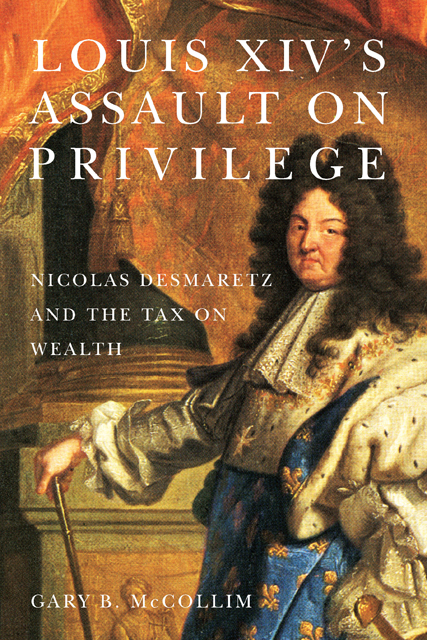Book contents
- Frontmatter
- Dedication
- Contents
- List of Illustrations
- Preface
- List of Abbreviations
- Introduction
- 1 The Fiscal System under Louis XIV
- 2 The Rise of the Administrative Monarchy
- 3 Nicolas Desmaretz and Company
- 4 Handling Ideas for Reform
- 5 The Establishment of the Dixième
- 6 After the Dixième
- Conclusion
- Appendix 1 The Conseil d’en haut, or the Council of Ministers
- Appendix 2 Members of the Royal Council of Finances under Louis XIV
- Appendix 3 Controllers General, Directors, and Intendants of Finances
- Appendix 4 Glossary of Terms
- Notes
- Bibliography
- Index
- Frontmatter
- Dedication
- Contents
- List of Illustrations
- Preface
- List of Abbreviations
- Introduction
- 1 The Fiscal System under Louis XIV
- 2 The Rise of the Administrative Monarchy
- 3 Nicolas Desmaretz and Company
- 4 Handling Ideas for Reform
- 5 The Establishment of the Dixième
- 6 After the Dixième
- Conclusion
- Appendix 1 The Conseil d’en haut, or the Council of Ministers
- Appendix 2 Members of the Royal Council of Finances under Louis XIV
- Appendix 3 Controllers General, Directors, and Intendants of Finances
- Appendix 4 Glossary of Terms
- Notes
- Bibliography
- Index
Summary
In 1710 the government of Louis XIV implemented a tax on income called the dixième (tenth) that required each property owner to declare the income that he received from any property that he owned. This tax violated one of the principles of French society at the time because it disregarded the social status of the property owner and only evaluated the tax owed on the basis of the income produced by the property. In effect, the new law disregarded the privileges that Louis XIV’s government had worked so hard to preserve or create in fashioning an ordered society. Previously, French social thinking had allowed certain social groups to remain exempt from direct taxation because they contributed to the state in other ways, that is, by serving in the military or in various courts, enforcing the king’s justice. In addition, the royal government had worked to grant privileges to certain corporate entities, such as towns and provinces with representative assemblies, and to sell privileges to anyone who could afford to buy them. The dixième would appear to wipe away all of those distinctions and to reduce the measure of one’s place in society to how much wealth one’s property earned. All property owners were equal and measured their contributions to the French state by how much money they earned. (The law did exempt church property from paying this tax because the Church could not be seen as paying for war, the principal reason for taxation.)
The traditional history of the Old Regime has repeated the argument for many years that the privileged orders did not pay direct taxes. In fact, recent historical research has described Louis XIV’s fiscal system as an alliance between the crown and the privileged orders to milk money from the lower orders and distribute it in the form of pensions, interest payments, offices, and gifts to the privileged orders. The privileges that the royal government created were then used to force the privilege holders to borrow money for the state; in return, the government would pay the interest on the loan from revenues derived from taxing the nonprivileged.
Nevertheless, the creation of the capitation in 1695 punctured that alliance by requiring all people to pay a tax based on either their social status or the status of the offices they held.
- Type
- Chapter
- Information
- Louis XIV's Assault on PrivilegeNicolas Desmaretz and the Tax on Wealth, pp. 1 - 13Publisher: Boydell & BrewerPrint publication year: 2012

